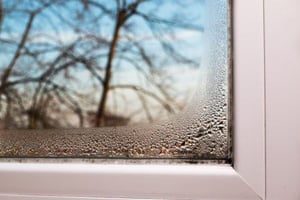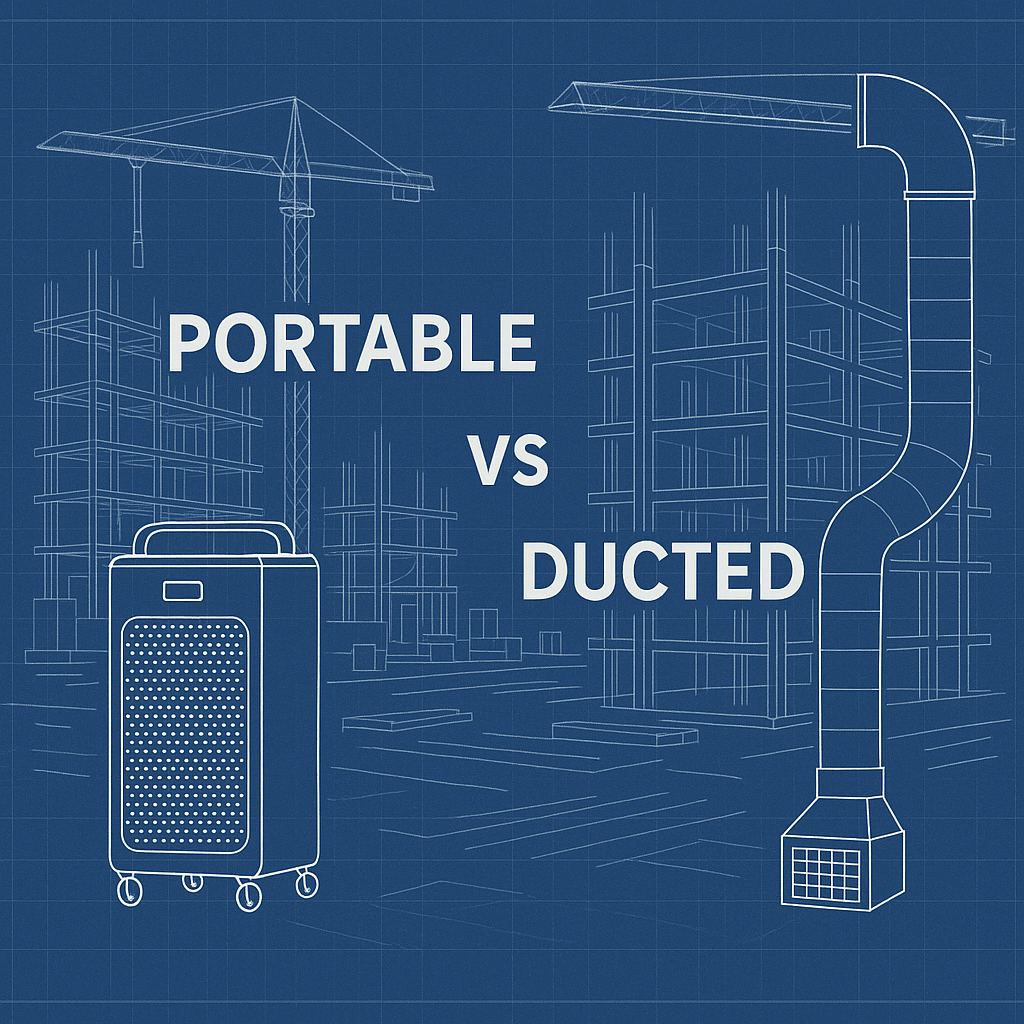 Are you considering buying a commercial grade dehumidifier? Like many who start researching dehumidifiers, you likely have a humidity problem and want to know if buying a dehumidifier can solve it and protect your property and assets. Or you might be sure you need a dehumidifier and now you want to know how to shop for the best one.
Are you considering buying a commercial grade dehumidifier? Like many who start researching dehumidifiers, you likely have a humidity problem and want to know if buying a dehumidifier can solve it and protect your property and assets. Or you might be sure you need a dehumidifier and now you want to know how to shop for the best one.
If you’re considering a commercial grade dehumidifier, our commercial & industrial dehumidifiers collection showcases units engineered to remove excess moisture in warehouses, factories and storage facilities. Follow this handy guide to buying a commercial dehumidifier in order to understand the reasons to buy a dehumidifier in the first place, the benefits and what to look for to get the best model for the needs of your home or business.
When and Why You need a DehumidifierTechnically, humidity represents the amount of water vapor in the atmosphere. When the air is humid, it feels wet, thick and heavy. Humidity may also be accompanied by a musty or other unpleasant odor. You may see mold, condensation, water damage or other signs of excess moisture.
Humidity indoors can represent a threat to both health and property, and ultimately, your business. Fortunately, a commercial dehumidifier can regulate the moisture in the air of any indoor environment — from a warehouse to an office to a crawl space — to give you a piece of mind. Find out all you need to know about commercial dehumidifiers before you buy.
Problems Caused by Excess Humidity
Excess humidity in your crawl space, warehouse, office, factory or other commercial building can result in damage to your property ranging from corrosion to mold and rot. It can ruin the products you sell and cost you money.
That's not the mention the health problems that excess moisture and mold can cause to people —when humidity gets out of control, your indoor environment can negatively impact the health as well as the comfort of you, your employees and your visitors. Respiratory problems, asthma and allergies are aggravated by moisture-related environmental factors. Too much humidity also promotes the growth of bacteria and attract pests.
Keeping indoor humidity low helps prevent mold and moisture damage, according to the EPA. Ideally, maintain a humidity level below 60 percent and target the 30 to 50 percent range.
Warning Signs of Too Much Moisture
Things you might be concerned about may include mold, wood rot, pest infestation, a weakened structure, water damage, respiratory conditions — such as allergies or asthma — or other health conditions, a damp or clammy environment or other air quality issues, or even a high heating or air conditioning bill. You may just want to maintain an optimal indoor environment to promote health and comfort.
Do certain environmental signs indicate you need a humidifier? Yes. Some will be obvious, and others less so. Some indicators you need the protection of a commercial grade dehumidifier include:
- Condensation collecting on windows, pipes and walls
- Puddles or streams of water
- Damp or wet surfaces or items
- Visible mold or mildew
- Brown spots or stains on drywall or other materials
- Buckling or warping of items or materials
- Doors or windows not closing
- Structural issues
- Corrosion
- Rotting wood
- Damp, heavy indoor air
- Musty or unpleasant odors
- Pests like termites, centipedes, silverfish, mites or rodents
Pests need water to survive and take up residence in moist, damp places. Once they’ve moved in, pests can cause allergies or further structural damage.
If you see any of these signs — and especially if you see a combination of them — it might make sense to consider a commercial grade dehumidifier. But what is the best commercial dehumidifier for you? There are many choices on the market.
Businesses that Need Dehumidifiers
There are many reasons a commercial dehumidifier might make sense for you. For example, your business or businesses you work with lies in a flood plain or another area that receives a lot of rain or experiences flooding regularly. Maybe the climate in your part of the country is generally sultry and humid. You might have a building or space with poor ventilation, or moisture in the air may be a byproduct of what you do. You may need to comply with health regulations or local ordinances related to your indoor environment.
Another reason you might be particularly concerned about indoor humidity is that you work with or sell products that are particularly sensitive to moisture, such as paper goods, food and the like. Damage to those items directly affects your bottom line.
Prime candidates for spaces that need a professional dehumidifier include:
- Offices
- Factories
- Basements
- Stores
- Pools, spas and hot tub areas
- Gym or locker room areas
- Warehouses
- Food production facilities
- Crawl spaces
- Storage facility or room containing moisture-sensitive items
- Any workplace with moisture issues
You may also be in the market for a commercial grade dehumidifier if your business works with clients needing flooding remediation or other water-damage restoration services.
Choosing the Right Size Dehumidifier
If you've determined you need the protection of a commercial grade dehumidifier, you may be overwhelmed with the choices on the market. Do you need a pool dehumidifier or a crawlspace dehumidifier or a model that meets specific needs? Ask yourself some questions before buying a humidifier online or elsewhere:
- How much moisture do you need to remove?
- How big is the area in which the unit will be used?
- Do you need to move the unit around or mount it in one place?
- Do you need a dehumidifier for restoration or ongoing climate control?
- What is your ideal range of humidity?
- What is the temperature of the indoor environment needing protection?
- Do you have any noise concerns?
- Do you have any installation needs or concerns?
- What is your budget?
Not sure which capacity you need? Complete our free dehumidifier sizing request to get a personalized recommendation within 24–48 hours.
Many consumers think their only choice is between a commercial grade model in the 70-pint range or a much smaller 30-pint dehumidifier. Keep in mind when considering a larger 70-pint dehumidifier is that they can be heavy to lift to draining or move. But also be wary of falling into the trap of trying to save money with a smaller 30-pint dehumidifier if you have big, ongoing humidity needs. Smaller units can be loud, can burn out quickly and then need replacement.
Also be warned that cheaper dehumidifier models sold in volume by big box retailers like Sears, Home Depot, Menards, and Lowes can also have issues, such as leaking and failing over time.
Talking to an experienced dealer that has a range of options for sale at this point may help you determine the answers to these questions and ultimately what type of commercial dehumidifier you need.
Other helpful information
Acronyms: Commercial dehumidifiers can generally handle the removal of anywhere from about 15 pints of water per day to more than 550 pints. This may be indicated by the acronym "PPD" — which stands for "pints per day" — on the label of any product you're reviewing.
You may also see the acronym "CFM," which stands for "cubic feet per minute." That measures the volume of air moved. Models with higher CFM ratings will circulate a bigger volume of air through the unit more quickly. You'll need to pick a unit with a fan that can draw the amount of air needed for proper dehumidification in the size of room where the unit will be installed.
Desiccant dehumidifiers: A type of commercial dehumidifier you might encounter is called "desiccant," which refers to a drying agent used in the moisture removal process. You're probably familiar with those tiny packets of what appear to be salt you find in shoe boxes or shipping packages... those are desiccants. Desiccant dehumidifiers rely on a drying agent rather than a compressed refrigerant to pull moisture from the air.
Desiccant dehumidifiers can be smaller, lighter, quieter and more efficient than other models, so may make a great option for more cramped quarters or environments where the noise level needs to be low. This type of unit can also work better at cooler temperatures. On the other hand, desiccant models are generally more expensive than compressor models, so may be out of the question for more limited budgets.
Portable dehumidifiers: For smaller applications, a portable dehumidifier may do the trick. A portable unit is great for basements, garages and other smaller areas. It works for temporary use, as opposed to a space needing constant humidity regulation over time. A portable of unit, which can be purchased for less than $1,000, also might make sense if you are a contractor that works with residential or commercial clients who need flood or moisture damage repair. Consider a model with wheels or casters so you can easily move it around.
Besides size and application, some dehumidifiers are made to work at lower temperatures. Other models are made specifically to remove moisture in pool or spa areas. Some may be more geared toward moisture damage restoration.
Dehumidifier features
Some dehumidifiers will have a bucket that fills water and needs to be emptied, while other commercial grade dehumidifiers have a pump that can be connected to an external drainage system. Opting for a commercial dehumidifier with pump means you won't have to manually empty the unit, a necessary convenience for some situations and businesses.
Humidistats: Another feature of a commercial dehumidifier is a humidistat, which allows you to monitor and adjust a room's humidity. Some models may even have digital humidistats, as well as ones you can control remotely.
Some commercial dehumidifiers may have an Energy Star rating, which indicates a more energy efficient product. Energy Star products are better for the environment and will save you money over time.
Among the manufacturers of commercial units to consider are an Ebac Dehumidifier or a Watchdog Dehumidifier, among others. Prices for commercial dehumidifiers range from about $800 to $10,000, depending on your needs. Talk to a dealer that has experience working with businesses like yours and offers a full range of options.
Are there Health Risks to Using a Dehumidifier?
In short: No, using a dehumidifier doesn't pose a risk. Some say dehumidifiers can cause minor dry skin, dry nose or chapped lips. Drinking enough water is the most important factor in keeping skin and lips healthy and moisturized.
Having high humidity however, that can be a danger to your health. A dehumidifier doesn’t completely strip the air of any water in it — and in fact can help you achieve the perfect balance to make your indoor environment safe, healthy and comfortable.




![4 Ways Indoor Humidity Can Cause Problems For Your Business [2025 UPDATED]](https://blog.purennatural.com/hubfs/a%20factory%20with%20extreme%20humidity%2c%20showing%20condensation%2c%20heavy%20air%2c%20and%20workers%20struggling%20with%20the%20damp%20environment.webp)

